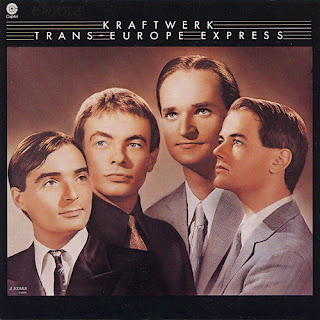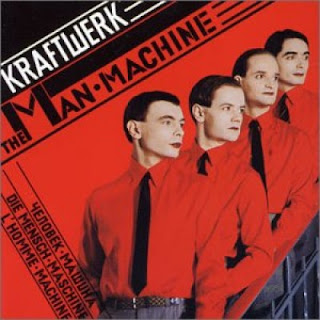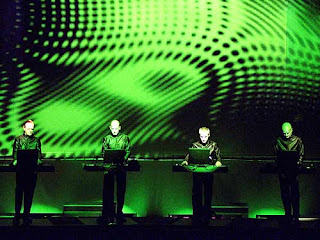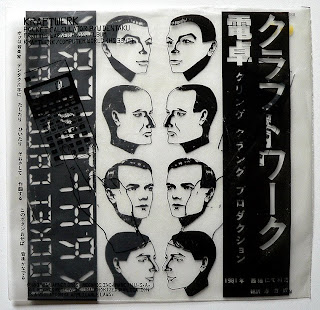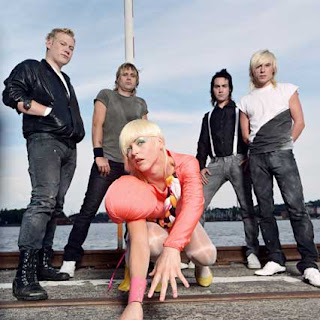Jag har varit frånvarande: besökte min hemstad (vilket var ett tag sen sist), låg på sjukhus några dagar, slirade över i Danmark, där jag bl a såg Miss Kittin & The Hacker.

Det var första gången jag var på Vega, men blev inte imponerad. Stället verkar drivas mer av en slags yrkesmässig formalism än något annat (vad det nu skulle vara). Samma sak med konserten. Miss Kittin är den enda pop-stjärna jag bryr mig om, och på skiva trivs hon bäst i sällskap av The Hacker. Inte på scen dock. Inte den här kvällen åtminstone. Visserligen är den kyliga framtoningen en viktig del av musiken, men det såg ut som de mest ville ha det hela överstökat (en jämförelsevis dålig kväll för dom, enligt Youtube). Favoriter som You & Us, The Soundtrack Of Now, Kiss Factory, Electronic City och Emotional Interlude saknades medan menlösa mellannummer som Rayban maldes fram helt glädjelöst. De följde åtminstone mitt råd och skippade den där Elvis-covern. PPPO, som inte är vidare spektakulär på skiva, växte till att bli rent överväldigande live – kvällens höjdpunkt.
Men det var inte främst Miss Kittin jag syftade på med rubriken.
Jag har märkt att de rap-låtar jag tvångsmässigt lyssnat på de senaste veckorna handlar om rap. Meta-rap, på ett eller annat sätt; två svenska nostalgiska tillbakablickar om att förälska sig i konstformen, en som handlar om att lära sig skriva rhymes (som sista låten på Blueprint, fast nervigare) och en hyllningslåt till döda rappare över Dead Presidents-beatet. (Tack snälle, gode Gud att det i alla fall inte rör sig om bittra New York-skallar som gnäller över att södern tagit över, att det är för mycket brudar i videos, att ingen bryr sig om veteraner som inte gjort nåt bra på femton år, osv. Jo, iofs var den där låten med Jadakiss, Saigon och Joell Ortiz som hette Hip Hop bevisligen riktigt bra, men ni vet vad som menas).
Vilken är bäst? Ken Rings Hip Hop eller Stors Min Freestyle?
Ken Ring – Hip Hop
Stor – Min Freestyle
Hip Hop är perfekt; fräsch, samplingsbaserad true-school som gräver in sig i hjärtat och citerar Nas mellan Kens innerligt tillbakablickande verser på ett mycket passande sätt. Masse å andra sidan lägger undan sin nyvunna kärlek för autotune och märkliga svennebanansamplingar och levererar det som TLK-traditionen utlovar; ständigt moderniserad och egensinnig New York-boom bap med Dogge i refrängen och kicks och snares likt betongblock. Ken visar visserligen varför han förtjänar att kallas för Sveriges bästa rappare, men Stors verser visar att troninnehavet inte är säkrat för all framtid. Rimtekniskt är han förbi, vad han gör i studion i framtiden kommer avgöra. Och vilken låt som är bäst får sommaren avgöra.
Playboy Tre – Bleachers
Max Minelli – Dead Rapperz
Likt många andra bra rappare från de södra staterna i USA är behållningen med Playboy Tre inte flerstavigheter, punchlines, battle-raps. Istället är det uttalet, närvaron, hur han rundar av sina stavelser, de ord han väljer att använda, hans ekonomiska uttrycksfullhet som räknas. Här har man inte glömt hur man använder rösten som ett instrument. Som Lil Wayne alltså, fast rakare, smartare.

Playboy Tre, the story of a drunk loner
På en låt som handlar om skriva är det dock passande att texten står i centrum. Hela Bleachers är citerbar, fylld med skarpa bilder och iaktagelser, beslutsamhet, trots, desperation, magsyra och svindel.
” What’s the point in having dreams if you never try?
It’s my story, now everybody knows why…
I’m in an empty gym, beating on the bleachers,
trying to get my lyrics right…
They say I’m doomed… but I got tricks up my sleeve…”
Max Minelli låter mer New York, även när han vill sätta Pimp C på 100-dollarsedeln. Vi får alltså det bästa av två världar (minus videokameran och den 13-åriga flickan). Att lägga Dead Rapperz över Dead Presidents är genialiskt. Resten av hans mixtape är också jävligt fint.
Medan meta-hiphop traditionellt är nostalgistkt förbittrade historier som skvallrar om ett skapande som gått i stå och förlorat självförtroende och självklarhet är dessa fyra exempel fokuserade, hungriga, framåtblickande. Jo, som sagt, den mest intressanta rap-musiken kommer inte från New York längre. Men den regionala spridningen är ett löfte om en pånyttfödelse.



/folder.jpg) ted Eero Johannes spreading his wings here, sometimes lifting from the lo-fi valleys of home to sail among the clouds in the sky. Lipton Service Boy delivers euphoric electro pop. He mixes dubstep and
ted Eero Johannes spreading his wings here, sometimes lifting from the lo-fi valleys of home to sail among the clouds in the sky. Lipton Service Boy delivers euphoric electro pop. He mixes dubstep and 




